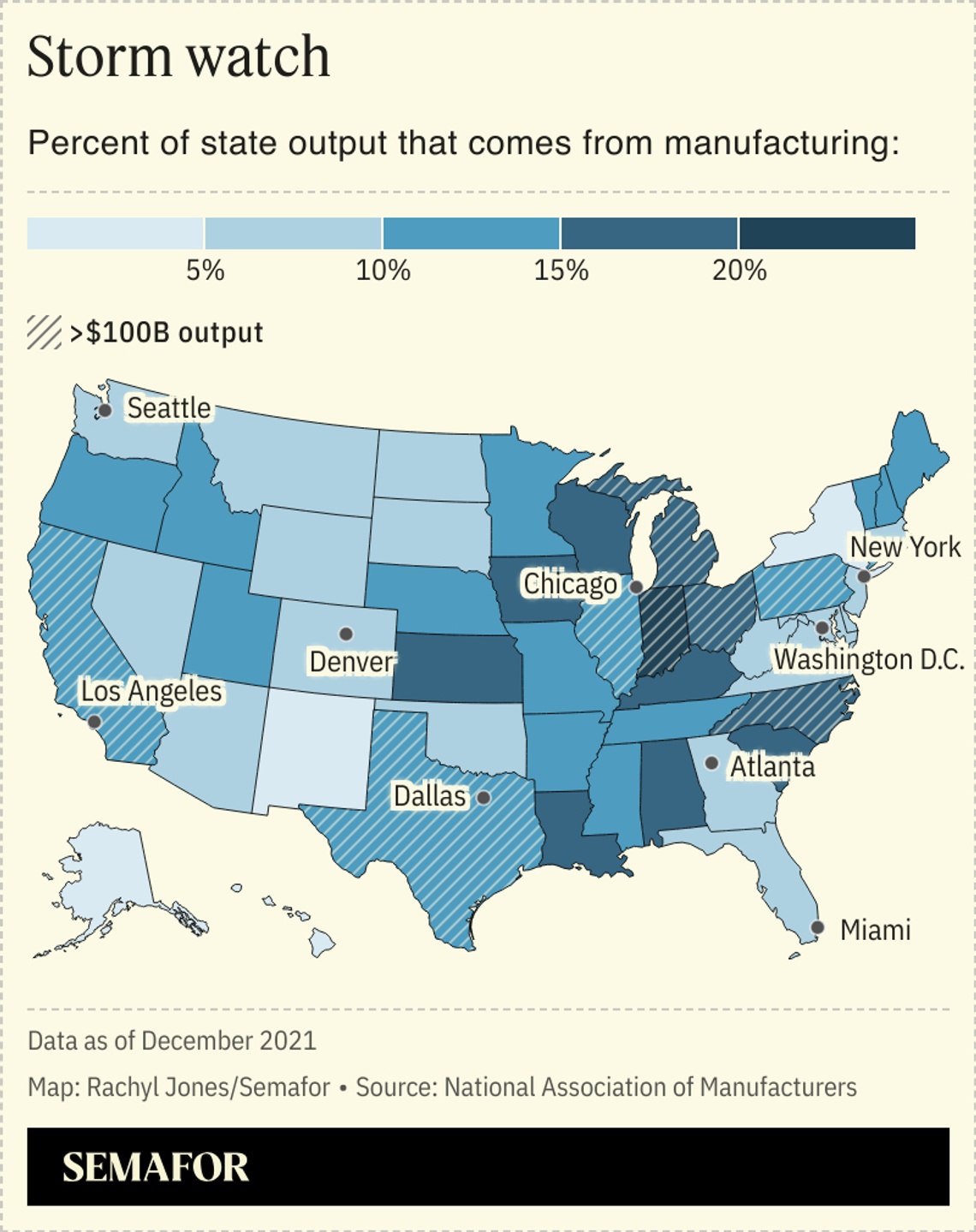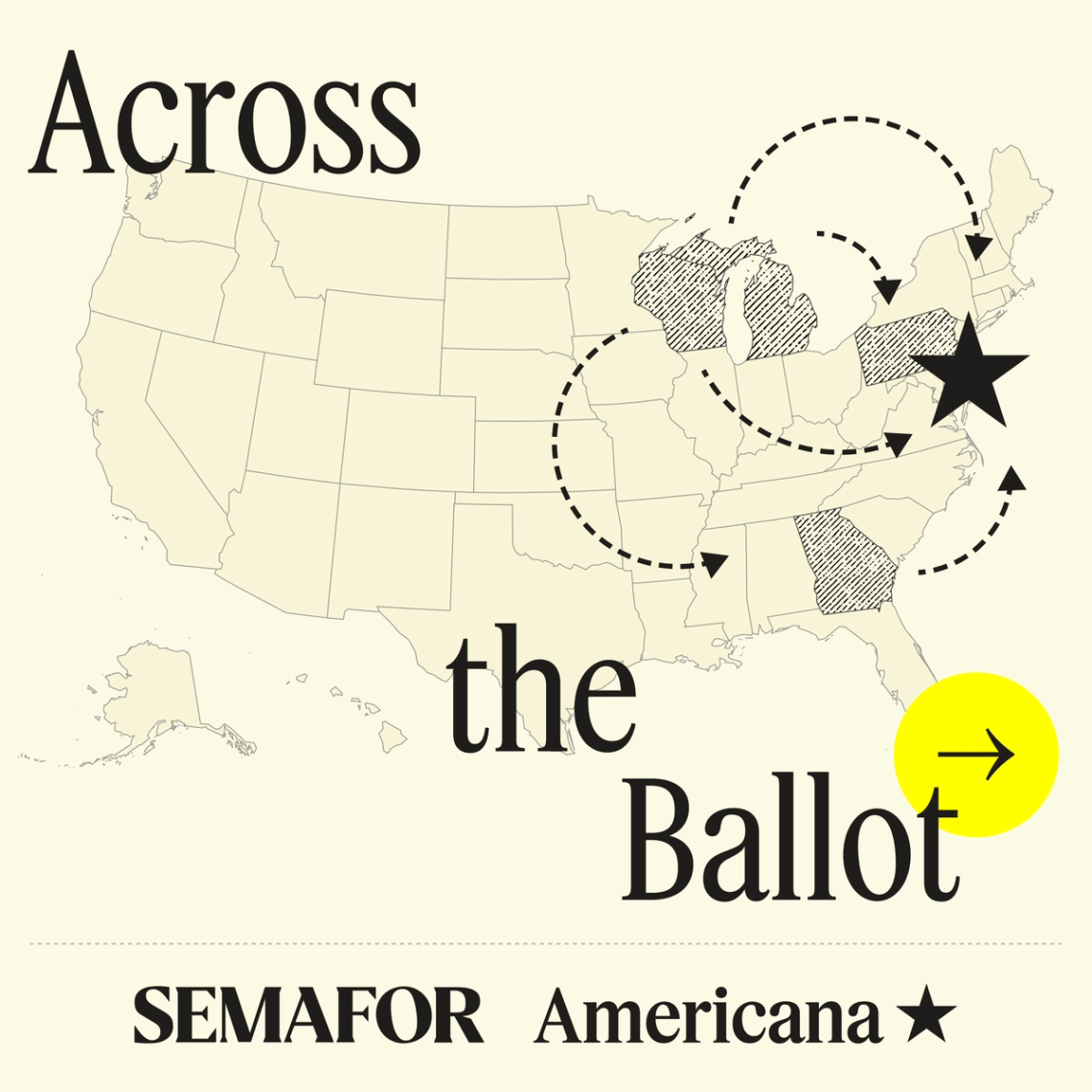| In today’s edition, we look at the final days of the US presidential race and a have a wrap-up from ͏ ͏ ͏ ͏ ͏ ͏ |
 | Mohammed Sergie |
|
Hi, and welcome back to Semafor Business. I’m Semafor’s Gulf editor, Mohammed Sergie, stepping in for Liz as she catches up from Riyadh.
Saudi Arabia’s Future Investment Initiative conference checked a lot of boxes — Wall Street’s elite on golf carts, Elon, Masa, annoying AI avatars — but didn’t deliver the blockbuster deals that have been a hallmark of the Gulf’s flagship business and finance event.
That’s probably a good thing: Oil prices are pressured, and even if they were higher, Saudi Arabia doesn’t have the capacity for more major projects. The country awarded $140 billion in contracts in 2023, a figure that’s set to grow 30% and make it the largest construction market in the world by 2028, according to consultancy Knight Frank.
While organizers hinted up to $30 billion in new deals will be announced, the final tally looks to be less than a third of that. Major ones include: The Saudi Public Investment Fund backed a $2 billion Brookfield fund targeting deals in the kingdom, and Google Cloud is building an AI hub in the Dammam province to advance Arabic language models.
Yasir Al-Rumayyan, the governor of the $930 billion PIF, signaled a shift to grow the 92 local companies in its portfolio. His regional deputy, Yazeed Al Humied, said the fund wants to develop local managers and support foreign firms that bring new financial products to the region. PIF is also exploring IPOs of its domestic holdings, not just to generate liquidity but also to deepen the Saudi market, he said.
FII wrapped up Thursday with Saudi foreign minister Prince Faisal bin Farhan, a rare voice on stage, to address regional turmoil. After over 500 speakers skirted the wars to the north — with the exception of Columbia University professor Jeffrey Sachs, who blamed the US for the conflicts in Gaza, Lebanon, Iran, and Ukraine, and the “US-China conflict” — Prince Faisal called for the establishment of a Palestinian state and criticized Israel’s “overreaction” to the October 7 attacks, a line that received enthusiastic applause.
Despite the tensions, the minister emphasized the ability of Saudi Arabia and the Gulf to pursue their development plans. “Geopolitical headwinds haven’t thrown us off course,” he said.
In many ways, FII is designed to transcend the broader region’s geopolitical challenges. FII is Saudi Arabia’s platform for showcasing itself as a top destination for capital, and in that, it hit the mark.
 Ted Soqui/Reuters Ted Soqui/Reuters➚ BUY: Gas. Abundant supply — the shale boom — made natural gas the biggest source of energy in the US, but it’s demand from data centers and crypto mining that’s keeping it there. Renewables are a distant second, a new report finds. ➘ SELL: Oil. Crude prices continue to shrug off Middle East turmoil after Israel spared Iran’s production facilities. And Starbucks pulls the Oleato, its olive-oil and conflict-of-interest-infused coffee drink, off the menu. |
|
 Courtesy of Future Investment Initiative (FII) Courtesy of Future Investment Initiative (FII)Call it momentum, or wishful thinking from a corporate set more comfortable with the White House occupant they know: Five days out, with the polls showing a dead heat, CEOs see Donald Trump with the edge. “It is a race that Trump is favored to win but it is almost a coin toss,” Citadel’s Ken Griffin said this week in Riyadh. General Atlantic CEO Bill Ford said the Republican candidate would be “very good for business, not just in the United States, but I think here in the Middle East,” speaking to Al Arabiya’s Hadley Gamble. Blackstone’s Steve Schwarzman — one of Trump’s earliest and most loyal CEO backers — shied away from making a prediction, saying Trump has “a much better base of knowledge of how that job works” than he did in 2016. The surprise remote appearance at the conference of Elon Musk, Donald Trump’s most committed supporter of late, sealed the view from inside the Ritz Carlton. He steered clear of politics during his 20-minute talk, beyond breezily noting: “I’ve also been playing a significant role in this election.” The view from abroad: “How people are talking is completely different than three weeks ago,” UBS CEO Sergio P. Ermotti said at Semafor’s World Economy Summit last week. A note of caution: A drop in the number of independent polls has given extra weight to partisan surveys that “create perceptions that Trump is stronger,” The New York Times reports. |
|
 Friday brings the first jobs report since hurricanes Milton and Helene, and the last one the Federal Reserve will see before it makes its next interest-rate move. Economists expect an increase of 110,000 jobs, which would be among the smallest monthly gains since 2020. Strikes at Boeing and several big hotel chains will also hit the numbers. Policymakers won’t overreact to temporary blips. But the emergence of the Southeast as America’s economic engine leaves the country newly vulnerable to wild weather brought on by climate change, experts say. “We’ve relied quite a bit on having better insurance, better building codes, beach nourishment, but we are still building in dangerous locations,” University of North Carolina professor Philip Berke told Semafor. “Even if [buildings are] still there, roads are damaged or cut off for long periods of time.” That’s what happened in North Carolina last month. Hurricane Helene cut off the factory that supplies 60% of the US’s IV fluids, causing a nationwide shortage that still persists. “There’s going to be a tipping point where the insurance rates and costs are going to get too high,” Berke said. Every time a natural disaster strikes, “we get closer.” |
|
 Elon Musk’s employees may share his visions of colonizing Mars, building electric robotaxis, implanting brain chips, and digging holes. But they don’t share his politics. Workers at his three biggest companies — X, Tesla, and SpaceX — have overwhelmingly donated to Democratic candidates and political action committees this election cycle, in which Musk has spent more than $75 million to elect Donald Trump and other Republicans. The data suggest that Musk’s companies follow the new Silicon Valley pattern — familiar across industries — in which the rank-and-file often support Democrats as executives lean Republican. |
|
 As the US races toward a historic election, Semafor Americana is your must-read guide. David Weigel delivers twice-weekly updates with the biggest stories, sharp analysis, and exclusive interviews, keeping you in the know about the presidential race's seismic shifts and key down-ballot contests. From polling insights to the latest ad strategies from campaigns and PACs, Semafor Americana gives you an insider’s look at American power in action. Sign up here. |
|
  The Economist The EconomistThe Economist is taking advantage of the space vacated by US news outlets including the Washington Post, Los Angeles Times, and USA Today, and endorsing Vice President Kamala Harris in the 2024 presidential election this morning. John Prideaux, the British publication’s US editor explained the decision to Semafor’s Max Tani: “We don’t think being independent and being opinionated are in conflict with each other. Reporters have strong views on the subjects they cover because they’re experts. It’s odd to pretend they don’t.” — For more on how the media is grappling with the US election, subscribe to Semafor’s weekly Media newsletter. Sign up here. |
|








